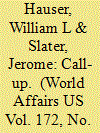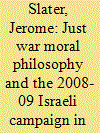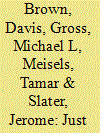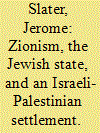|
|
|
Sort Order |
|
|
|
Items / Page
|
|
|
|
|
|
|
| Srl | Item |
| 1 |
ID:
095426


|
|
|
| 2 |
ID:
055442


|
|
|
| 3 |
ID:
115344


|
|
|
|
|
| Publication |
2012.
|
| Summary/Abstract |
The 2008-09 Israeli military campaign in Gaza, commonly known as Operation Cast Lead, is best understood in the context of Israel's "iron wall" strategy. During the 1930s, the strategy emphasized the need for overwhelming military power to break Arab resistance to the establishment of a Jewish state in Palestine; since the creation of Israel in 1948, it has continued to be at the core of Israeli policies in the overall Arab-Israeli conflict. From the outset, the strategy has included attacks on civilians and their crucial infrastructures. Such attacks violate the just war moral principles of discrimination and noncombatant immunity. In addition, Cast Lead violated the just war principles of just cause and last resort, which state that wars must have a just cause and even then must be undertaken only after nonviolent and political alternatives have failed. Israel did not have a just cause in 2008-09, because its primary purpose was to crush resistance to its continuing de facto occupation and repression of Gaza. Further, Israel refused to explore the genuine possibility that Hamas was amenable to a two-state political settlement. Thus, the iron wall strategy and Operation Cast Lead, in particular, have been political as well as moral failures, undermining rather than serving Israel's genuine long-term security needs.
|
|
|
|
|
|
|
|
|
|
|
|
|
|
|
|
| 4 |
ID:
122089


|
|
|
| 5 |
ID:
080679


|
|
|
|
|
| Publication |
2008.
|
| Summary/Abstract |
The prospects for a two-state solution to the Israeli-Palestinian conflict remain poor, largely because of Israeli rigidity as well as Palestinian policies and internal conflicts. The United States has failed to use its considerable influence with Israel to seek the necessary changes in Israeli policies, instead providing the country with almost unconditional support. The consequences have been disastrous for the Palestinians, for Israeli security and society, and for critical U.S. national interests in the Middle East. Amajor explanation for the failure of U.S. policies is the largely uninformed and uncritical mainstream and even elite media coverage of the Israeli-Palestinian conflict in the United States. In contrast, the debate in Israel is more self-critical, vigorous, and far-ranging, creating at least the possibility of change, even as U.S. policy stagnates. Acomparison of the coverage of the Israeli-Palestinian conflict by the two most prestigious daily newspapers in the United States and Israel-in particular, over the breakdown of the peace process in 2000 and the ensuing Palestinian intifada, the nature of the Israeli occupation, the problem of violence and terrorism, and the prospects for peace today-underscores these differences. While the New York Times has muted the alarm over the dangers of the United States' near-unconditional support for Israeli policies toward the Palestinians, Haaretz has sought to sound the alarm.
|
|
|
|
|
|
|
|
|
|
|
|
|
|
|
|
| 6 |
ID:
142177


|
|
|
|
|
| Summary/Abstract |
Is terrorism — commonly understood to mean deliberate attacks on innocent civilians — ever justifiable, or at least subject to morally persuasive distinctions? I will argue that while terrorism is always morally wrong, it is both possible and desirable to distinguish between degrees of moral wrongness. I will examine this issue in the context of just-war moral theory and the Israeli-Palestinian conflict.
|
|
|
|
|
|
|
|
|
|
|
|
|
|
|
|
| 7 |
ID:
072466


|
|
|
|
|
| Publication |
2006.
|
| Summary/Abstract |
Jerome Slater argues that in certain circumstances in the war on terrorism, the coercion or perhaps even the torture of captured terrorists may be both necessary for national security and morally a lesser evil than the preventable mass murder of innocents.
|
|
|
|
|
|
|
|
|
|
|
|
|
|
|
|
| 8 |
ID:
087610


|
|
|
|
|
| Publication |
2009.
|
| Summary/Abstract |
John Mearsheimer and Stephen Walt's controversial book, The Israel Lobby and U.S. Foreign Policy1 (hereafter, Israel Lobby), is one of the most important foreign policy works of our times. It can be understood, in effect, to be two different books: one on the U.S. foreign policy process concerning the Middle East in general and Israel in particular, the other on the substance of those policies. The book's central argument that the Israel lobby dominates the U.S. Middle East policy process has attracted almost all the attention of the critics, and while many of the criticisms are overstated or even vicious, the argument is indeed problematic in several ways. Unfortunately, the controversy over the Mearsheimer/Walt argument about the power of the Israel lobby has resulted in a general ignoring of their more important "second book," the far-ranging and mostly compelling critique of the substance of U.S. policies in the Middle East.
|
|
|
|
|
|
|
|
|
|
|
|
|
|
|
|
| 9 |
ID:
117472


|
|
|
|
|
| Publication |
2012.
|
| Summary/Abstract |
JEROME SLATER critically examines the case for the continuation of Zionism and for Israel to remain a Jewish state. He argues that while much of the Zionist argument is unconvincing, "liberal Zionism" is still defensible. Consequently, he claims, that first the Palestinians should conditionally recognize Israel as a Jewish state as part of an overall Israeli-Palestinian peace settlement, and second the Israelis should agree to the creation of an independent and viable Palestinian state in the occupied territories, so that the Palestinian Israelis who choose to remain in Israel are treated as fully equal citizens as the Jews.
|
|
|
|
|
|
|
|
|
|
|
|
|
|
|
|
|
|
|
|
|